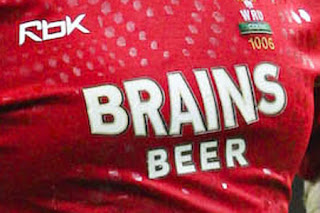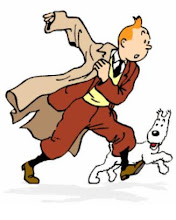
Back when I had no sense or taste towards who to support in football I used to wander around in the latest Chelsea shirt. Inspired by the likes of John Spencer, Ruud Gullit and Gianfranco Zola, I was proud to wear the blue top with roaring lion badge placed over the heart and Coors sponsor across the front. What made me prouder was that I was wearing a replica shirt to that of my hero’s, one of the main reasons why I wanted the shirt so much.
All grown up and now supporting a different team in a lesser division, it came to my surprise the other week when I was walking around sports shops in Cardiff to find that the Brains beer logo had been removed from the junior replica Welsh national rugby shirts. Taken aback I asked the manager if the kit was awaiting a new sponsor. She laughed and told me that when the new kit was launched back in October the Brains logo was excluded from the junior shirts because it was seen as unsuitable for children below drinking age to be wearing a shirt sporting an alcoholic beverage logo for fear that it would encourage children to drink.
I was honestly shocked and quite baffled. “It’s not a replica if the shirt is not the same as what is worn by the players on the pitch!” came by reply. The lady just shrugged.
I thought back to all the times I used to wear those Chelsea shirts with Coors on the front. Then I thought of all the times I had wandered into a pub and asked for a pint at age ten because I had been encouraged too from the logo.
Wait a second? I never did! Nor can I ever recollect being driven to want to drink due to the fact Zola had just smashed in the winner at the bridge whilst wearing a shirt with an alcoholic logo on it.
.
This was all very confusing to me and the strange thing was the more people I asked in Cardiff, the fewer seemed to know about the decision taken.
Neither probably wanted to, as far as I can make out this was a decision taken
by stealth with no official statement made through the media.
More interestingly why take away the sponsor logo from the shirt when the Brains logo will still be plastered all over the stadium and on the adult’s version worn by the likes of Shane Williams and James Hook? Player’s youngsters look up to.
.
Will removing it honestly stop young fans from drinking? Will keeping the logos on junior replicas mean that more innocent lips are due to taste alcohol this year?
The removal of the Brains logo has left a huge void on the shirts and I honestly think the WRU and Brains will run into a huge problem with this move.
I thought back to my younger years, let’s face it most children are fickle. Like me, the majority only want the shirt because it’s a replica of what their sporting hero’s on the pitch are wearing. I don’t think I would have worn my Chelsea shirt so proudly if it was any different to that of Zola’s.
If the logo is removed then surely this will have a huge impact on sales figures of the Welsh junior replicas. I have already heard a child in one of the sports shops complaining to his mother because the shirt he was shown was “not the same as dads or James Hook’s”
What’s the solution?
Is there one in this politically correct world?
Wales are not the only sports team to use alcoholic sponsors on their shirts.
Liverpool and Everton are the best examples of alcoholic sponsors in the UK.
In Wales, Super League team, Celtic Crusaders are also sponsored by Brains. I called their office to see if they had been asked or told to remove their logo from junior replicas ahead of the new season.
It was confirmed to me from a very good source from within the club that there were NO plans to remove the logo from the junior shirts, nor had they been asked to via any authority.
However I was reminded that whenever the team play in France, the logo is either removed or changed due to the fact the advertisement of alcohol is illegal and banned.
This of course begs the next question. Will the UK follow suit to the French example?
It seems the only possible answer, not that I think this should happen! But if you are changing or removing logos from junior kits for this reason then they are no longer replicas to what the players wear on the pitch. If they are not replicas people are unlikely to pay the expensive price for them. From this sales could drop, if this happens the club will find a new sponsor that is not alcoholic.
Due to the money involved, neither Liverpool or Everton are likely to give up their sponsors without a fight any time soon.
However, a big shake up could be around the corner from taking place with sports sponsorship in the UK. The tobacco industry has already been quashed, no longer allowed to advertise via any means in Britain.
Will the Government soon follow suit with alcoholic advertising?
It’s a real possibility and the first steps could have already have been taken in Wales.
***
Images courtesy of - http://www.rbs6nations.com/, www.scrumoftheearth.com/rugby_news/content, http://www.theage.com.au/news/soccer/zola-puts-hands-up-for-job/2007/11/23/1195753308212.html, http://www.guardian.co.uk/media/2008/aug/15/advertising.sun





